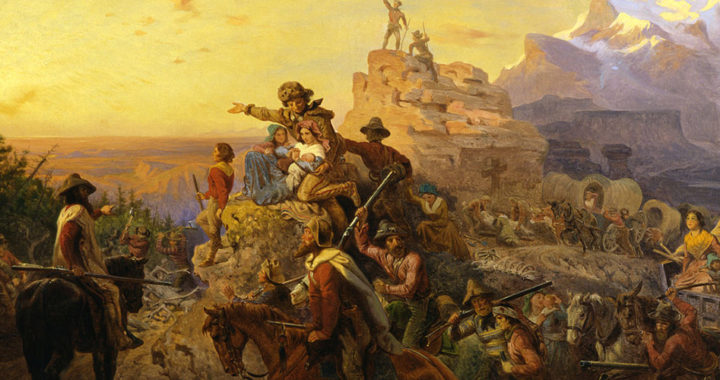Lexical Origins: Where Did The Term “Manifest Destiny” Originate?
Historians have attributed the origin of the term “manifest destiny” to newspaper editor and Democratic Party advocate John O’Sullivan. Accordingly, he specifically coined the term in 1845 to promote the annexation of Texas and the Oregon Country to the United States.
Note that he first used the term “divine destiny” in the article “The Great Nation of Futurity” he wrote in 1839 to describe the inevitable role of the U.S. in promoting values such as equality, rights of conscience, and personal enfranchisement, as well as in establishing “on earth the moral dignity and salvation of man.”
The actual usage of the term “manifest destiny” appeared in the essay “Annexation” that O’Sullivan wrote in 1845. He specifically said that the U.S. should annex Texas because it was its “manifest destiny to overspread the continent allotted by Providence for the free development of our yearly multiplying millions.”
Nevertheless, the Democrat Party also used the term to justify the Mexican-American War that lasted from 1846 to 1848 and the division of Oregon into half with Great Britain. However, other American settlers used it to criticize and mock the propositions and efforts aimed at expanding the territories of the U.S.
Definitions: What Exactly Is Manifest Destiny? What Was the Idea Behind It?
The generally accepted definition of manifest destiny is that it is an ideology or belief that the U.S. has a god-given purpose of expanding across North America, particularly by extending its territories from the east or the Atlantic coast to the west or the Pacific coast. Through this ideology, adherents believe that conquering and controlling territories were both justified and inevitable.
However, historians have highlighted the fact that the specific scope of the concept was contested. In his book, Mark Joy explained that the Democrats recognized and promoted the idea, but numerous prominent American politicians such as Abraham Lincoln and Ulysses S. Grant, as well as the Whigs Party, rejected and criticized it.
It is also worth mentioning that there was no set of principles that defined the concept. Scholars have asserted that it was a general idea and not a specific policy championed in laws and other legal pronouncements.
Nevertheless, in his book, historian William E. Weeks noted three themes underpinning the definition or idea behind manifest destiny. These are the vision of the American people and their institutions; the mission to spread these institutions; and the destiny under God to do this work. Photo Credit: Painting of Fort Lamerie by Alfred Jacob Miller/Adapted
FURTHER READINGS AND REFERENCES
- Joy, M. 2013. American Expansionism, 1783-1860: A Manifest Destiny? New York: Routledge. ISBN: 978-058236965-8
- O’Sullivan, J. 1845. “Annexation.” United States Magazine and Democratic Review. 17(1): 5-11. Available online
- O’Sullivan, J. 1839. “The Great Nation of Futurity.” The United States Magazine and Democratic Review. 6(23). Available online
- Weeks, W. E. 1996. Building the Continental Empire: American Expansion from the Revolution to the Civil War. Chicago: Ivan R. Dee. ISBN: 978-1-56663-135-8





